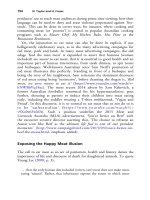The palgrave international handbook of a 224
Bạn đang xem bản rút gọn của tài liệu. Xem và tải ngay bản đầy đủ của tài liệu tại đây (39.39 KB, 1 trang )
Collecting Wildlife
219
enforcers to explain away their actions. Much like those who are caught
speeding by traffic enforcement cameras challenge the legitimacy of the
cameras, the fines imposed or argue that cameras are simply a revenue raising
device, hobby wildlife offenders dispute that their activities fall within the
remit of the criminal law. In the case of the hobby wildlife offender, the fact
that wildlife legislation does not fall within the remit of the criminal law and
mainstream criminal justice responses is a factor that allows offenders to
classify their activities as minor crime. In the case of egg collecting, for
example, it is only with the introduction of the Countryside and Rights of
Way Act 2000 that offences have carried a limited option for prison sentences.
However, the existence of laws prohibiting taking of wild birds’ eggs for more
than 50 years indicates that such activities have been socially constructed as
unacceptable within contemporary morality. Undoubtedly, animal collecting
both legally and morally is a form of animal abuse.
References
Arkow, P. (1996). The relationship between animal abuse and other forms of family
violence. Family Violence & Sexual Assault Bulletin, 12(1–2), 29–34.
Ascione, F. R. (1993). Children who are cruel to animals: a review of research and
implications for developmental psychopathology. Anthrozoos, 4, 226–227.
Baker, J. (1997). Trophy hunting as a sustainable use of wildlife resources in
southern and Eastern Africa. Journal of Sustainable Tourism, 5, 306–321.
Barkham, P. (2006, December 11). The egg snatchers. The Guardian. http://www.
theguardian.com/environment/2006/dec/11/g2.ruralaffairs. Accessed 10 January
2015.
Becker, H. (1963). Outsiders: studies in sociology of deviance. New York: Free Press of
Glencoe.
Beirne, P. (2007). Animal rights, animal abuse and green criminology. In P. Beirne
& N. South (Eds.), Issues in green criminology: confronting harms against environments, humanity and other animals Cullompton: Willan.
Beirne, P., & South, N. (eds.) (2007). Issues in green criminology: confronting harms
against environments, humanity and other animals. Devon: Willan Publishing.
Belk, R. W. (1995). Collecting in a consumer society. London: Routledge.
Benton, T. (1998). Rights and justice on a shared planet: more rights or new
relations? Theoretical Criminology, 2(2), 149–175.
Bever, L. (2015). The death of cecil the lion and the big business of big game
trophy hunting. Washington Post. />ing-mix/wp/2015/07/29/how-the-death-of-cecil-the-lion-at-the-hands-of-amer
ican-walter-palmer-has-shed-light-on-the-big-business-of-big-game/. Accessed
10 January 2015.









